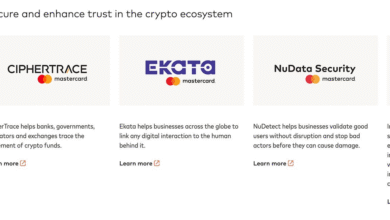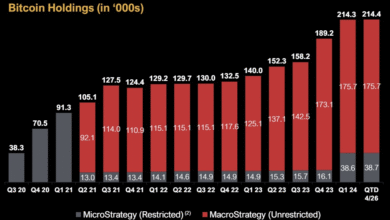Bitcoin ETFs: Blackrock and Fidelity Invest $548 Million

Bitcoin ETFs have recently captured the spotlight in the financial world, thanks to an impressive influx of capital amounting to $548 million, driven primarily by notable players like Blackrock and Fidelity. These exchange-traded funds are transforming the landscape of cryptocurrency investments, offering investors an accessible route to participate in the booming Bitcoin market. With 12 consecutive days of net inflows, Bitcoin ETFs are clearly gaining momentum and investor trust, a trend that aligns with the broader movement toward mainstream acceptance of digital currencies. As major institutional investors continue to embrace Bitcoin investment, the implications for ETF investments extend beyond mere numbers, influencing cryptocurrency trends across the sector. Not to be overlooked, the success of Bitcoin ETFs signals a pivotal moment that could reshape the future of investment strategies in the realm of digital assets.
In recent times, fund products designed to track the performance of Bitcoin, commonly referred to as Bitcoin exchange-traded funds (ETFs), have piqued the interest of investors globally. Major financial institutions like Blackrock and Fidelity are backing these innovative investment vehicles, which provide an easier mechanism for traditional investors to engage in the cryptocurrency space. This surge of institutional participation signifies a shift in the investment paradigm, highlighting the importance of cryptocurrency-focused investment tools. As Bitcoin-related fund offerings grow, they present a unique opportunity for investors seeking exposure to digital currencies while leveraging familiar trading practices. The rise in popularity of such financial instruments not only reflects changing market dynamics but also points to a potential long-term acceptance of cryptocurrencies in the investment community.
The Rise of Bitcoin ETFs and Institutional Interest
Bitcoin ETFs have recently captured the attention of institutional investors, fueling a significant rise in investment inflows. Major financial institutions like Blackrock and Fidelity have played a pivotal role in this increasing momentum, with their combined investments of $548 million showcasing a clear shift towards more traditional financial backing for what was once considered a niche asset class. Such trends indicate a growing acceptance of cryptocurrency investments within mainstream finance, further legitimizing bitcoin as an investment vehicle.
The continued support from formidable players underscores a sense of confidence among investors who are looking for diversification through ETFs. With Blackrock leading the charge, its Bitcoin ETF, IBIT, has not only surpassed other offerings but has also turned into a preferred option for those seeking exposure to digital currencies. As we witness institutional demand only intensifying, understanding the implications of these investments will be crucial for both seasoned and novice investors.
Blackrock’s Dominance in Bitcoin ETFs
As one of the largest asset management firms globally, Blackrock’s significant inflow into its Bitcoin ETF, IBIT, showcases the firm’s commitment to leveraging emerging technology and trends in the financial landscape. With $340.28 million drawn from new capital, Blackrock’s ETF strategies are setting the standard for institutional-grade cryptocurrency investment products. This remarkable uptake not only amplifies Blackrock’s position as a market leader but also illustrates a robust strategy towards integrating cryptocurrency within the traditional investment framework.
Blackrock’s proactive approach towards Bitcoin ETFs resonates well with investors who are increasingly looking for secure and regulated ways to enter the cryptocurrency market. Their IPO-like structure also makes these investment vehicles more appealing to those who may have been hesitant to purchase the underlying assets directly. By creating a pathway for investment in Bitcoin through ETFs, Blackrock facilitates a smoother transition for traditional investors into the crypto space.
Market Impact of Fidelity’s Bitcoin ETF Investment
Fidelity’s recent investment of $115.19 million in Bitcoin ETFs further solidifies its status as a formidable player in the cryptocurrency market. This strategic move indicates Fidelity’s recognition of the robust demand for Bitcoin as a long-term asset, catering to both institutional and retail investors. As Fidelity continues to innovate in the realm of digital assets, its influence is likely to foster increased interest and further adoption across the industry.
Moreover, Fidelity’s emphasis on building a comprehensive suite of cryptocurrency products positions it to capitalize on emerging trends. Their commitment to Bitcoin as an investment reflects the broader trend of mainstream financial establishments embracing digital currencies. As more institutions follow in Fidelity’s footsteps, the landscape of ETF investments could very well transform, leading to enhanced liquidity and a diversified investment approach.
Ethereum ETFs Join the Momentum
While Bitcoin ETFs are making headlines, Ether ETFs are also witnessing remarkable growth amidst the prevailing cryptocurrency trends. With a net inflow of $60.41 million, these Ether ETFs, particularly Blackrock’s ETHA, are gaining significant traction, highlighting the expanding interest in Ethereum as a complementary investment to Bitcoin. The success of Ether ETFs showcases an accelerating acceptance of multiple cryptocurrencies within the investment community.
Given that Ethereum powers a multitude of decentralized applications, the growing confidence in Ether as an investment option could lead to a diversification of investor portfolios. By acknowledging the unique value proposition and potential of Ethereum, alongside Bitcoin, asset managers can offer a well-rounded investment strategy that encapsulates the dynamics of the cryptocurrency market. As institutional demand continues to mount, the performance of Ether ETFs could reshape the conversation around digital asset investments.
Understanding the Total Net Assets in Bitcoin ETFs
The recent surge in capital flow has propelled the total net assets for Bitcoin ETFs to $133.56 billion, marking a significant milestone in the evolution of cryptocurrency investments. This total represents a collective trust from both institutional and retail investors, and it’s a testament to the belief in Bitcoin’s potential as a store of value and a hedge against inflation. Such a robust net asset figure may encourage more players in the market to consider Bitcoin ETFs as a viable investment option.
Moreover, the increased total assets underscore the importance of analyzing the broader market trends influencing investor decisions. The inflow of diverse capital sources signals a paradigm shift in how Bitcoin and other cryptocurrencies are perceived. As more investments flood into Bitcoin ETFs, monitoring these figures will be crucial for gauging market sentiment and predicting future movements in cryptocurrency investments.
Competitive Landscape of Bitcoin ETFs
As the market for Bitcoin ETFs continues to grow, so does the competition among asset managers looking to stake their claim. Firms such as Ark 21Shares and Bitwise are emerging alongside giants like Blackrock and Fidelity, offering their own products that cater to varying investor needs. This competition serves to enhance innovation, driving down costs and improving the accessibility of Bitcoin investments for the average investor.
The expanding array of Bitcoin ETFs also allows investors to choose based on their individual risk appetites and investment strategies. Whether an investor prefers a high-profile firm like Blackrock or a more niche offering from emerging players, the proliferation of ETF options enhances the overall market appeal. Analyzing these competitive dynamics will be essential for identifying potential opportunities within the Bitcoin ETF landscape.
Investing in Bitcoin ETFs: Benefits and Risks
Investing in Bitcoin ETFs presents numerous benefits, particularly for those who may be wary of direct cryptocurrency ownership. By trading ETFs on established markets, investors can enjoy the convenience of traditional trading hours, regulatory protection, and potentially lower transaction costs. Furthermore, Bitcoin ETFs allow investors to gain exposure to cryptocurrencies without the need to directly handle wallets or navigate exchange platforms, mitigating several risks associated with direct ownership.
However, these advantages are not without their own set of risks. Investors must remain cognizant of the underlying volatility of Bitcoin prices, which can lead to significant fluctuations in ETF performance. Additionally, various factors such as regulatory changes and market adoption could influence the long-term stability of Bitcoin ETFs. Understanding these risks is essential for making informed decisions in the rapidly evolving cryptocurrency market.
Future Trends in Cryptocurrency ETF Investments
As institutional interest in cryptocurrency ETFs continues to grow, it’s essential to consider future trends that may shape the market. Innovations in blockchain technology, coupled with evolving regulatory frameworks, could pave the way for even more sophisticated investment products in cryptocurrencies. These developments might make it easier for traditional investors to engage with cryptocurrencies, thereby further bridging the gap between traditional finance and the burgeoning world of digital assets.
Additionally, the rising interest in sustainable investments could lead to the creation of Bitcoin and Ether ETFs that focus on eco-friendly practices. As environmental concerns gain prominence in investment discussions, ETFs that align with sustainable principles may attract a new subset of investors. Evaluating these trends will be critical for those looking to navigate the intersection of cryptocurrency and traditional investment strategies.
The Role of Major Players in Shaping Bitcoin ETF Demand
The influence of leading financial giants like Blackrock and Fidelity in the Bitcoin ETF market cannot be underestimated. Their strategic investments not only bolster the credibility of Bitcoin as a legitimate asset class but also set a benchmark for other institutions to follow. As these players continue to advocate for cryptocurrency investment vehicles, their actions could spearhead a broader acceptance of digital assets across various industries.
Moreover, as more major players enter the Bitcoin ETF space, the resulting competitiveness could lead to enhanced product offerings and better pricing structures for investors. This growing pool of institutional support may also catalyze further regulatory advancements, ultimately fostering a more stable environment for Bitcoin and other cryptocurrencies. As the demand for Bitcoin ETFs evolves, the role of these key players will be pivotal in shaping the future landscape of cryptocurrency investments.
Frequently Asked Questions
What are Bitcoin ETFs and why are Blackrock and Fidelity investing in them?
Bitcoin ETFs are exchange-traded funds that track the price of Bitcoin, allowing investors to gain exposure to the cryptocurrency without directly holding it. Blackrock and Fidelity are investing in Bitcoin ETFs to capitalize on the growing demand for cryptocurrency investment products, driven by increasing institutional interest and the potential for high returns.
How have Bitcoin ETFs performed recently with the influence of Blackrock and Fidelity?
Bitcoin ETFs have demonstrated strong performance, recording a streak of net inflows for 12 consecutive days, largely thanks to contributions from Blackrock and Fidelity. Together, they accounted for significant investments that bolstered total net assets to $133.56 billion, showcasing sustained investor confidence.
What is the significance of Blackrock’s and Fidelity’s investments in Bitcoin ETFs for cryptocurrency trends?
The investments by Blackrock and Fidelity in Bitcoin ETFs signal a major endorsement of cryptocurrency trends among institutional investors. Their participation not only enhances the legitimacy of Bitcoin investments but also encourages other institutions to follow suit, potentially leading to further growth in the cryptocurrency market.
How do Bitcoin ETFs fit into the broader landscape of ETF investments?
Bitcoin ETFs represent a niche within the broader ETF investments by offering exposure to a volatile asset class, cryptocurrency. As institutional players like Blackrock and Fidelity invest significantly in Bitcoin ETFs, it highlights a shift in portfolio strategies that embrace alternative assets and adaptive investment approaches in today’s market.
What are the potential risks associated with investing in Bitcoin ETFs?
Investing in Bitcoin ETFs carries certain risks such as market volatility, regulatory changes, and the potential for lower liquidity compared to direct Bitcoin investments. Investors should consider these factors and their own risk tolerance before participating in Bitcoin ETFs, especially given the substantial influx from major asset managers like Blackrock and Fidelity.
What can we expect for the future of Bitcoin ETFs following recent investments from major firms?
With ongoing investments from notable institutions like Blackrock and Fidelity, the future of Bitcoin ETFs appears promising. We can expect continued growth in net inflows, enhanced regulatory clarity, and increased mainstream adoption of Bitcoin as an investment vehicle, which will likely attract more institutional and retail investors.
How do the inflows to Bitcoin ETFs impact the overall cryptocurrency market?
Increased inflows into Bitcoin ETFs, propelled by firms like Blackrock and Fidelity, can have a positive impact on the overall cryptocurrency market. These capital inflows contribute to price stability, increase market legitimacy, and can lead to greater acceptance of cryptocurrencies by traditional financial institutions.
Can retail investors also benefit from the rise of Bitcoin ETFs?
Yes, retail investors can benefit from the rise of Bitcoin ETFs as they provide an accessible way to invest in Bitcoin without the need for direct cryptocurrency trading. This opens up investment opportunities for individuals who may be less familiar with the complexities of managing cryptocurrencies directly.
| Aspect | Bitcoin ETFs | Ether ETFs |
|---|---|---|
| Investment Inflows | $548 million | $60.41 million |
| Key Contributors | Blackrock, Fidelity, Ark 21Shares, Bitwise, Vaneck | Blackrock, Bitwise |
| Top ETF Performers | Blackrock’s IBIT ($340.28M), Fidelity’s FBTC ($115.19M) | Blackrock’s ETHA ($55.18M), Bitwise’s ETHW ($5.23M) |
| Total Net Assets | $133.56 billion | $9.91 billion |
| Daily Trading Volume | $3.17 billion | $345.95 million |
Summary
Bitcoin ETFs continue to attract substantial institutional investment, demonstrating a robust confidence in cryptocurrency as a viable asset class. With major players like Blackrock and Fidelity leading the way, the performance of Bitcoin ETFs reflects significant inflows, while Ether ETFs also show growth. As institutional interest surges, Bitcoin ETFs are positioned for a bright future in the evolving financial landscape.




